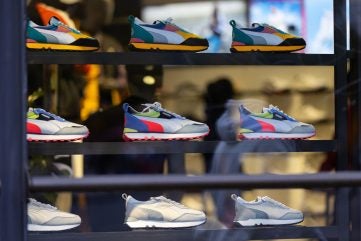
Puma reported a 9.8% decrease in its group sales to €1.98bn ($2.15bn) and by 4% on constant-currency basis for its fourth quarter (Q4).
For FY23, the sports brand reported a currency-adjusted sales growth of 6.6% to €8.6bn, which it said was despite a volatile environment, however it argued that excluding the “extraordinary” devaluation of the Argentine peso, sales would have grown by more than 8% in the period.
It added that “adverse currencies” led to a negative impact on sales of more than €400m in its full year results.
However, GlobalData’s senior apparel analyst Pippa Stephens argues the Argentine peso devaluation cannot be blamed alone.
She pointed out that Puma has been significantly impacted by consumers cutting back on discretionary purchases amid high inflation.
She explained: “The slowdown of the sportswear market weighed on Puma’s performance in FY2023, with its reported sales rising by just 1.6% to €8.6bn and operating profit falling by 3.0% to €622m.”

US Tariffs are shifting - will you react or anticipate?
Don’t let policy changes catch you off guard. Stay proactive with real-time data and expert analysis.
By GlobalDataStephens added that a similar trend has been witnessed at other sports powerhouse players like Nike and Adidas, with consumers switching to newer brands like Gymshark and Alo Yoga also impacting their performances.”
Puma fourth quarter results (Q4)
Geographically speaking, the Americas region was said to be significantly impacted by the devaluation of the Argentine peso, resulting in a decline of 6.4% to €846m.
The EMEA region also saw sales decrease by 5.2% to €668m on the back of generally higher inventory levels which Puma said resulted in lower sell-in while the sell-through remained strong.
In contrast, Asia/Pacific sales increased by 2.8% to €468.3m, with the brand pointing out its strong growth in Greater China and India. The rest of Asia was reportedly softer, impacted by consumer sentiment and warm weather conditions.
Puma’s operating result (EBIT) increased 133% from €40.5m to €94.4m. While, its net income decreased by 42.3% to €0.8m from €1.4m as a result of negative currency conversion effects.
Puma FY23 results
From a geographical standpoint for Puma’s FY23 results the Asia/Pacific region led its growth with a 13.6% increase in sales, closely followed by the EMEA region with a 13.4% increase in sales.
However, it reported that its sales in the Americas region decreased by 2.4% due to the devaluation of the Argentine peso.
Puma’s operating result (EBIT) decreased 3% to €621.6m and its net income decreased by 13.7% to €304.9m.
Arne Freundt, chief executive officer at Puma, is of the view that Puma delivered strong results fully in line with the outlook, amid a volatile environment impacting the whole industry.
He called the Argentine peso devaluation a significant “one-off” accounting impact, adding that without it, Puma’s results would have been “even stronger”.
He continued: “2023 was also an important milestone year for Puma as we started to lay the foundation for future growth based on strengthening our brand and improving our distribution quality. We are today in a better position than we were at the start of 2023: We established a new marketing organisation and started to execute our new marketing strategy to elevate the brand. We also built new management teams in the US and China to execute our local must-win strategies and cleared our inventories to healthy levels.”
Puma’s outlook for 2024
Puma further expects geopolitical and macroeconomic headwinds as well as currency volatility to persist in 2024. It said these conditions already led to muted consumer sentiment and volatile demand in 2023 and anticipates these effects to continue in 2024, particularly in the first half of the year.
Freundt said: “As we are working through this ongoing challenging trade environment together with our retail partners with a clear focus on sell-through and prudent sell-in especially in the US and Europe, we expect a softer first half of the year.”
However, Puma emphasised that on the back of its product newness and ongoing brand momentum, the brand foresees an improvement quarter-over-quarter leading to a currency-adjusted mid-single-digit growth and improved operating result in the range of €620-€700m for the full year.
Freundt called 2024 the year of Sports with several launches planned including its “fastest” football boot Ultra, and “fastest” running shoes Fast-R2 and Deviate Nitro Elite 3.
Puma is also launching its first brand campaign in 10 years to bolster its positioning as the so-called “fastest sports brand in the world” and deepen its emotional connection with its consumers.



